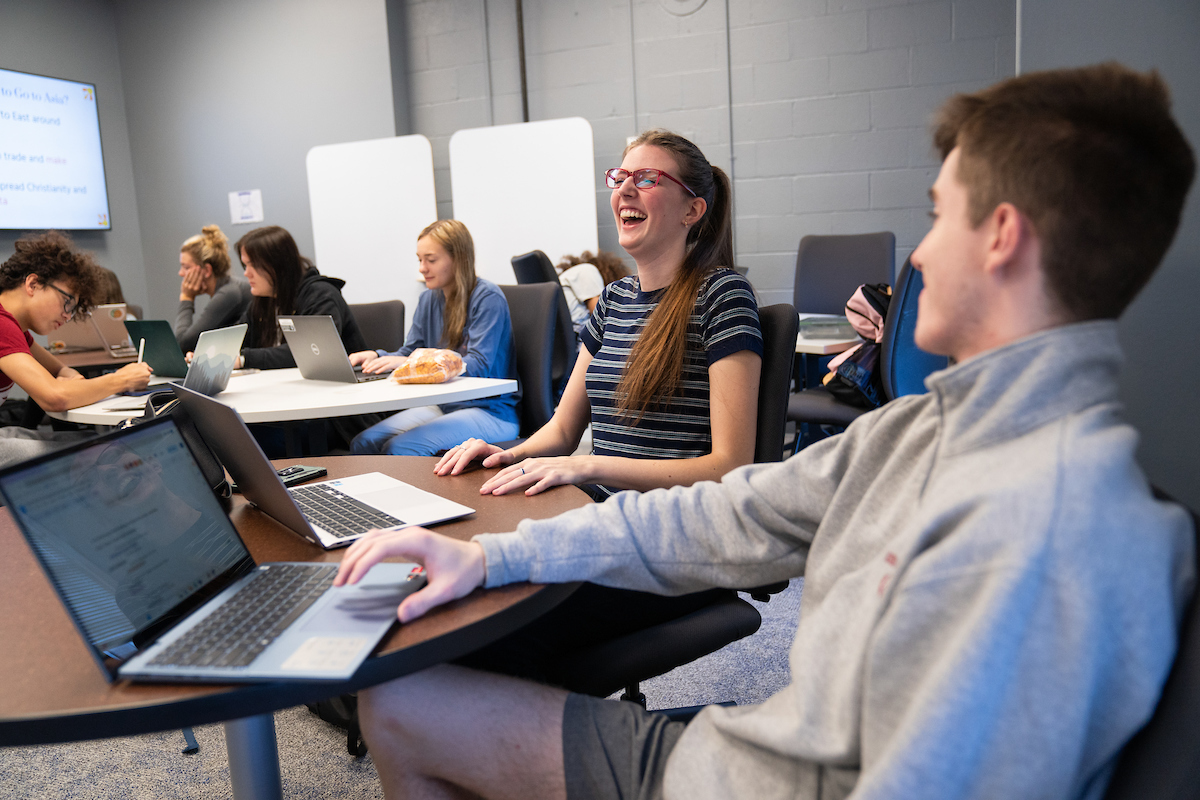A cohort of 81 first-year students at Aquinas College have now completed two four-credit college courses this semester, and it’s only October.
These students are enrolled in an innovative pilot program that allows them to complete one class at a time. Available at only a handful of United States colleges and universities, one-class-at-a-time scheduling, also known as the block model, is getting resoundingly positive reviews from both students and faculty.
The evolving needs of modern students were central to Aquinas College’s decision to pursue this new scheduling model. This class of freshman had their education disrupted by the beginning of the COVID-19 pandemic, and so did the next several incoming classes.
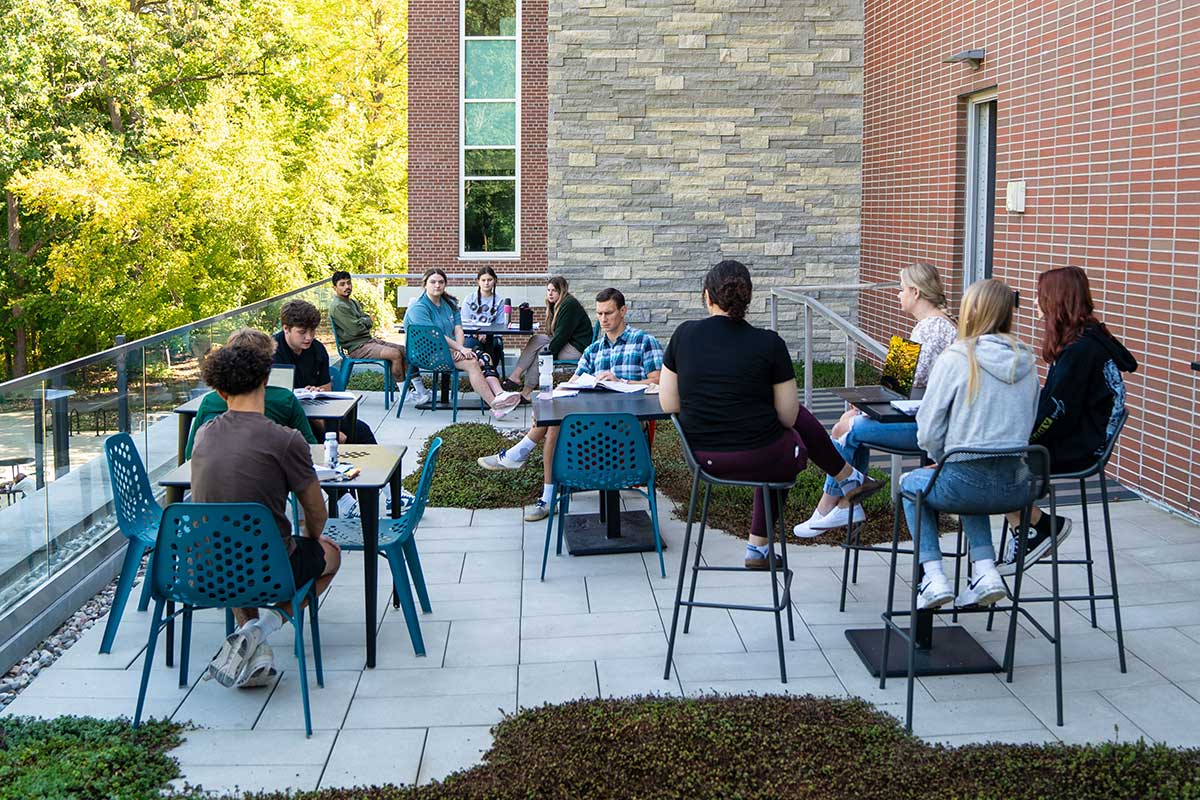
Students and Professor Rob Peters hold class on the green balcony of the Albertus Magnus Hall of Science Building which overlooks the Aquinas campus.
“We have a group of students that are seeking meaningful experiential and relationship-based teaching,” Dr. Gretchen Rumohr, Associate Provost of Academic Affairs, explains. “We went through a period of inquiry, exploring what other colleges were doing and felt the block model would be an excellent fit for today’s students.”
And so far, students agree. From a survey of students in the block model pilot, out of 77 respondents, not a single student said they would not recommend the block model to their peers in traditional schedules, and 98% of respondents felt the block model positively impacted their engagement and participation in classes.
What does taking one class at a time look like?
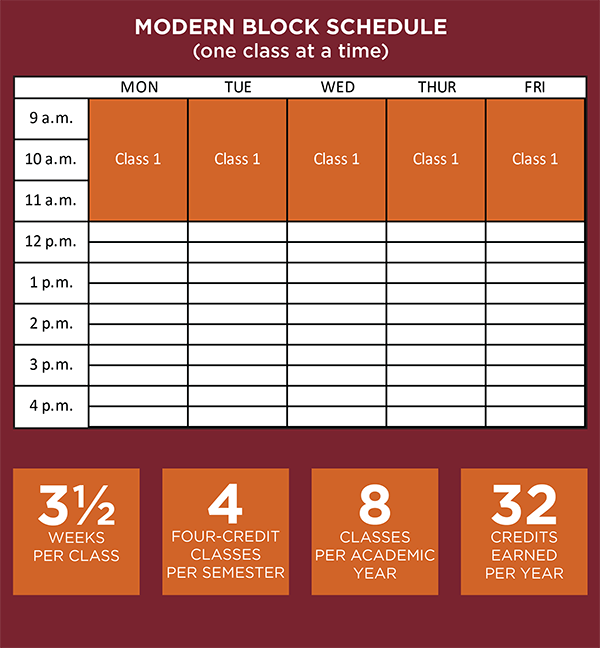 In a traditional schedule, college students take several classes in a week and their
schedules can be vastly different from day to day. For example, Monday’s classes could
begin at 8 a.m. and Tuesday’s might not start until the afternoon. Students may have
difficulty scheduling their work hours, developing a routine or managing the expectations
of several professors at once across a variety of subjects in traditional schedules.
In a traditional schedule, college students take several classes in a week and their
schedules can be vastly different from day to day. For example, Monday’s classes could
begin at 8 a.m. and Tuesday’s might not start until the afternoon. Students may have
difficulty scheduling their work hours, developing a routine or managing the expectations
of several professors at once across a variety of subjects in traditional schedules.
With block scheduling, students are in the same class Monday through Friday from 9 a.m. to noon. They immerse themselves in a single course for three and a half weeks, complete their final assessments and then enjoy a four-day weekend before beginning their next class in a new subject. Each semester, students take four four-credit classes for a total of 32 credits per year, more than what is required for graduation in four years.
One reason students have said that they enjoy this model is that it gives them the opportunity to fully immerse themselves into the subject they’re currently studying. For those three and a half weeks, they have the time and space to explore what it means to be historians, writers, biologists and more. They aren’t splitting their interests and time between several subjects.
“When you focus on only one class, it’s just that homework and you can center yourself on studying for that class,” said first-year student, Maria Hillary. “When you have multiple classes, it’s a lot more difficult to decide what you should study for. If I only have one class, that’s my priority.”
Freshman Chloe Russell agrees. “It’s just one class, so I don’t have to worry about anything else,” she said. “My stress is pretty low compared to my senior year of high school.”
The flexible afternoons and consistent routine also help students manage their time as they settle into a new environment. Scheduling a hangout with friends, work hours, time to complete homework, or team practices is simplified.
“I definitely have a lot more free time,” said Jason Swanson, a first year history major and member of the swim and dive team who chose to enroll in the block model. “It’s just nice that I’m in class for three hours, and then I’m done… I’ll go to swim practice and I’m part of the history club, too. It gives you the opportunity to do those things because you’ve got that consistent schedule.”
Experiencing Subjects Firsthand
With three hours in class each day, faculty have been able to design their courses with embedded experiential learning opportunities. Experiential learning prioritizes hands-on, real world active learning, or learning by doing, followed by reflection. For example, Dr. Amy Dunham Strand’s First Year Seminar, which focuses on the topic of climate justice, spent its first class day planting wildflower plugs at the Marywood campus of the Dominican Sisters of Grand Rapids .
“We also went to the farmer’s market,” said first-year student Maria Hillary. “We walked there, and we got to talk to the vendors and ask them questions. That was really cool to see: what people in the real world are doing to try to help the environment and how it affects everybody’s lives. It made me more connected to what I’m learning in class.”
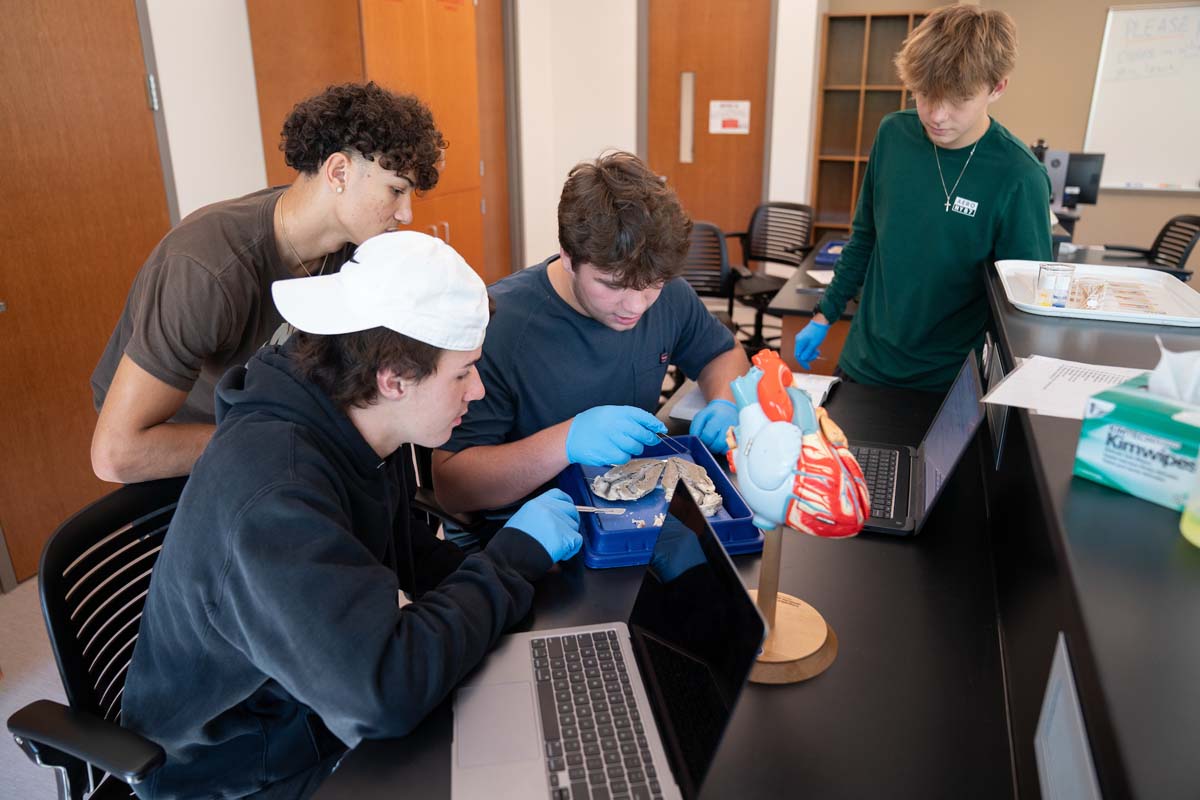
Students in a block model Human Biology class dissecting a heart.
In Rob Peter’s Human Biology class, students regularly visit the lab to see the anatomies they’re discussing firsthand.
“I’m actually in the middle of dissecting a heart right now,” Nick Dashner told us during his Human Biology lab. “Next Friday we’re taking a field trip to an exhibit to showcase the human body, which I think will be fun.”
“We had students visit the Grand Rapids Public Museum collection at the Community Archives and Research Center for their World History class,” said Dr. Rumohr. “They got to be historians. Those are the kinds of experiences that students remember. They’re the kinds of experiences that breed community. And they’re also the kinds of experiences that make for really memorable, impactful teaching.”
Fostering Connection in the Classroom
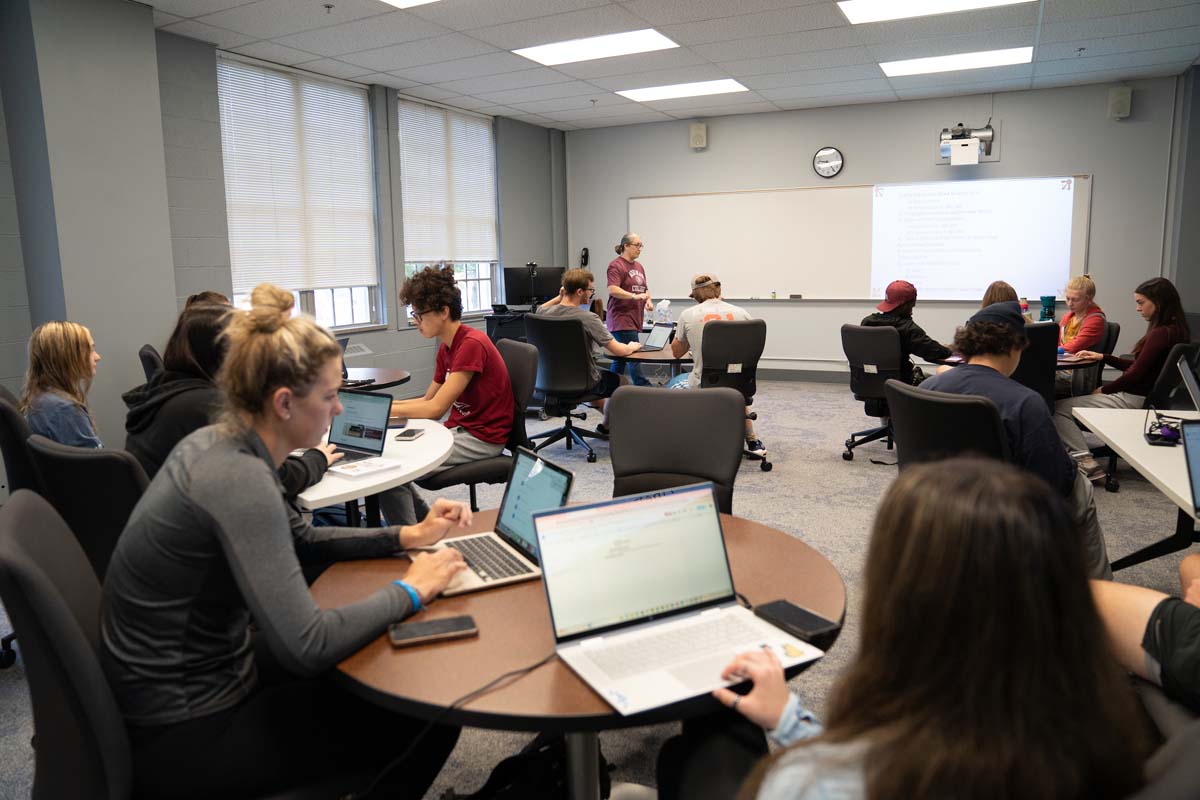
The block model has also deepened classroom relationships as students strengthen bonds with each other as well as with professors. For first-year students, who are adjusting to an entirely new community, there is notable value in seeing a group of peers regularly. Some students even feel like they’ve found lifelong friends in the block.
“I have a few really close friends already, even though it’s only been six and a half weeks so far,” said Joseph Pupillo. “It’s great to have that so early on in the semester.”
“We’re moving through this together,” said Preslee Hall. “The block definitely makes it a lot easier to talk to people and get to know people. It’s really nice to get myself in a position where I can make friends easily.”
Professors, who are used to seeing several classes of students during the week, are also witnessing the benefits of this relationship-rich environment. The connections mean students are more comfortable in discussions and more willing to ask for help.
“From a teacher’s perspective, I got to know my students much more quickly than I would in a regular semester,” said Dr. Dunham Strand. “And they’re generally more present.”
The block model pilot is set to continue for the rest of the 2023-2024 academic year and will welcome a new cohort of first-year students in the 2024-2025 academic year. Aquinas College will likely decide whether to extend one-class-at-a-time scheduling across the entire curriculum before the end of this academic year. If they decide to extend the program to all classes, the change would happen in the Fall of 2025.
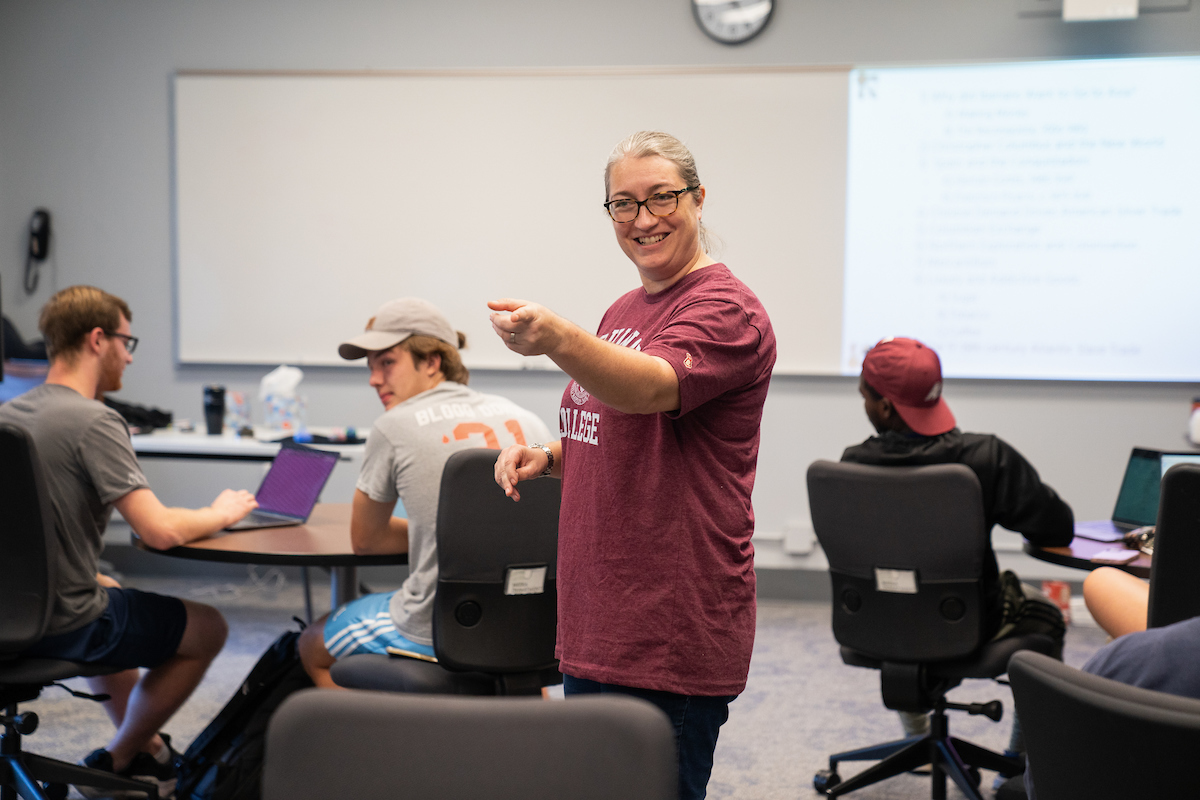
Dr. Bethany Kilcrease teaches World History to freshmen in the Aquinas College block model.
Professional development is available to faculty as such decisions are weighed. “We received a $185,000 grant to establish the Center for Teaching Excellence on campus,” said Dr. Rumohr. “We will be giving out course redesign grants to teachers who wish to learn more about this model so teachers will be supported as we move forward.”
Spots for next year are limited. First-year applicants who are interested in enrolling in the block model should indicate interest in one-class-at-a-time scheduling when they apply and make their deposit by March 1st to be considered for one of the limited block spaces in Fall of 2024.
